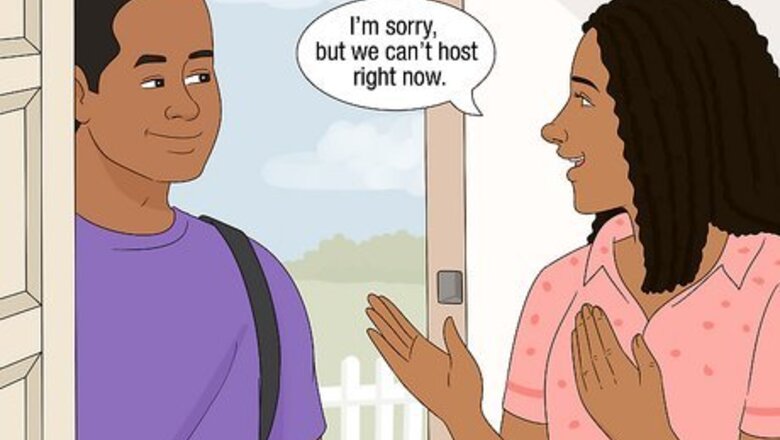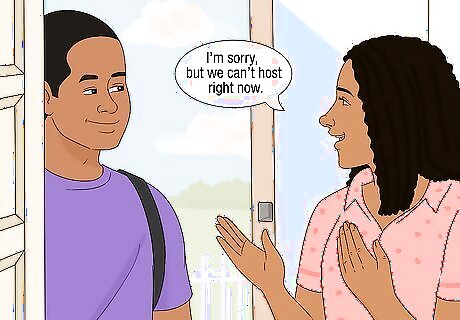
views
Be direct and turn them away.

It’s okay to simply say “no” and set boundaries to protect your energy. You might be worried about sounding rude, but remember the other person is being inconsiderate by inviting themselves over. Keep your responses short and to the point so you prevent any further discussion. If they show up unannounced say something like, “Hi! I’d love to catch up but wish you’d let me know beforehand. I’m not free today.” If they’re asking to stay at your house try, “I’m sorry, but we can’t host right now” or “Unfortunately, it won’t work for us to host.” If they invite themselves along to an event tell them, “We’d really like to spend time with just our family. I’ll let you know when we do this again.”
Suggest an alternative after you say no.

Soften your response by offering to spend time with them later. If you’re not comfortable hosting but still want to catch up, suggest grabbing a meal or doing something fun away from your house. You could suggest showing them around while they’re in town or just meeting up for coffee. “I can’t host you while you’re in town, but could we get lunch that weekend?” “Today doesn’t work for me to hang out, but how about tomorrow?” “I was hoping for some time alone with Trevor, but would you like to come out with us on Friday?”
Request advance notice next time.

Prevent uninvited guests from repeating their behavior. It’s completely reasonable to ask that they let you know ahead of time if they’re going to show up at your house. If you don’t consider yourself an assertive person, it might feel uncomfortable at first to set clear expectations. However, in the long run, setting boundaries can give you more control over your life and your relationships. “Hey! It's nice to see you, but I'd appreciate a phone call next time.” “I'm happy to get together with you, but I'd like to know earlier in the day if you plan to stop by.” "Things have been so hectic lately, I generally can't hang out unless we arrange it ahead of time." “I know you enjoy coming over here and I really enjoy seeing you, but I just don’t like people dropping in. In the future, I'd like it if you called ahead of time to see if I’m available.” Depending on your relationship with the person, you could even use some self-deprecating humor to lighten the mood, like “Could you give me a head’s up next time? I don’t want to be doing something embarrassing when you drop by!” Reader Poll: We asked 195 wikiHow readers who’ve had to kick someone out, and 52% felt that you should evaluate the situation and the person before using humor to ease the tension. [Take Poll]
Put a time limit on their stay.

Stop "short" visits from becoming indefinite stays. Setting an itinerary can help you avoid dealing with guests who overstay their welcome. For instance, you could tell them you’re only available to host for a weekend, or for 3 days, or a week. Choose a limit that feels right for the amount of time and energy you have to entertain your guest. Try saying something like this, "Here's what we were thinking. You could come in on Monday, we can go to the beach and show you downtown, and then you can head out on Wednesday before we have to take TJ to camp. How does that sound?"
Set clear boundaries within your social circle.

You get to decide who comes over to your house and when. If lots of friends or family members invite themselves over, you might want to make some sweeping changes to what you allow. Whether it’s at your next family gathering or in a group text, politely tell everyone that you won’t be able to host moving forward. Say something like, “I’ve loved getting to see you, but I’ll be taking a break from hosting so I can recharge.”
Talk privately with repeat offenders.

The other person might not know how much their behavior affects you. If you’re worried they’ll feel like you don’t want them around, try to center the conversation around your needs and your schedule. You can even drop in some reassurance by starting off with a positive statement about your relationship before bringing up what you need to change in your dynamic. “I’ve been feeling pretty drained lately and need to take some ‘me time.’ Could we stop meeting up at my house?” “I love eating dinner with you, but I like to stick to my routines. Could we plan our dinners in the future?” “I’m really grateful for your friendship, but I need more time to myself, so I won't be able to hang out as much.”
Re-evaluate the relationship.

If this person takes more than they give, reconsider the relationship. Give them a chance to change their behavior after you set boundaries and talk with them about what you need. You deserve to surround yourself with people who lift you up and respect what you need to be happy. If this person can’t do those two key things, it’s okay to let them go. Here are different options to end the friendship, from least confrontational to most direct: Tell them you need time away from your relationship: “I’ve been feeling stressed lately, so I’m taking time for myself. I don’t want to text or get together for a while.” Use an “I feel” statement to tell them how their behavior hurt you: “I feel uncomfortable when you show up unannounced, and I’d like to step back from spending time together.” Try a short, direct statement for someone who won’t take the hint: “I can’t spend time around someone who won’t respect my boundaries. I don’t want to see you anymore.”
Prepare yourself for negative reactions.

It's okay to say no, even if the other person doesn't like it. You can control your tone of voice, body language, and the way you phrase your request, but you can’t control how someone else will react. If they respond by feeling hurt or offended, validate those feelings but avoid over-apologizing or justifying why you don’t want them inviting themselves over. First, validate how they feel, “I know this isn’t what you expected and I know you’re disappointed.” Then, find a place to agree with part of what they’ve said, “I wish we could spend more time together, too.”
Work on prioritizing your needs.

Check in with your emotions to start setting better boundaries. If you generally say yes to most requests, you may lose touch with how you actually feel about having someone in your house. If someone shows up and says, “Can I come in?” take a moment to tune into your body’s reaction. If you don't want to get up to open the door or you feel a wave of stress, that’s your body’s signal that the uninvited guest is crossing a line. How you feel and what you need is important. If you're constantly bending your own needs to accommodate others, you can lose sleep, get angry or upset, and end up feeling drained.
Notice what energizes and drains you.

Some social situations might be more draining than others. For instance, it’s normal to feel excited when an old friend shows up unannounced, but you might feel completely drained after they stay for more than a few hours. Are there situations that feel good and others that feel bad? Are there certain people you can tolerate and others you can’t? Once you answer those questions, you can set appropriate limits to protect your time and energy in the future. For instance, you might like the person who drops in but get stressed out when they start to unload all their negativity onto you. You might love hosting your family for the holidays but prefer that they stay out of the kitchen while you’re making dinner. You might really like spending time with your friend but get annoyed when she invites her boyfriend over, too.

















Comments
0 comment